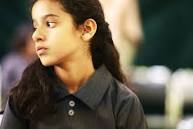Wadjda is a cinematic rarity, the first Saudi Arabian feature-length film to be directed by a female Saudi woman.
Haifaa al-Mansour’s movie, shot entirely in Saudi Arabia, one of the world’s most closed and theocratic societies, is ostensibly innocuous.
Wadjda (Waad Mohammed), a spunky 1o-year-old Saudi girl, has her heart set on a green bicycle. To her, it’s a symbol of freedom and equality. But in her arch conservative country, where women are forbidden to drive a car or venture out without an escort, girls on bikes are positively frowned upon.

In telling this simple story, Mansour delves into the nooks and crannies of Saudi society, revealing some unpalatable truths through an implicitly subversive script.
The film, which unfolds in a dusty and drab suburb of Riyadh, the Saudi capital, reveals one of these truths when Wadjda’s austere school principal advises her to lower her voice. A woman’s voice, she says in no uncertain terms, is “her nakedness.”
When Wadjda tells her mother (Reem Abdullah) that she wants a bicycle, she is quite shocked. “Have you ever seen a girl on a bicycle?” she asks incredulously. At another point, her mother exclaims, “As long as I live, you won’t have one.”
Mansour, a liberal, presumably believes that Saudi women are entitled to civic rights, but in her quietly absorbing film, these points are made without stirring up a fuss.
Thanks to a male friend of her age who obviously likes her, Wadjda experiences the thrill of taking a bicycle on a spin. But Wadjda, a stubborn girl, wants her own bike. The question, of course, is whether she will be allowed to buy one.
Like virtually every female in Saudi Arabia, Wadjda faces a myriad of implicit and explicit restrictions, as the film suggests. Women should know their place, and they should behave subserviently in the company of men.
A sub-plot also speaks to the impoverished status of Saudi women. Wadjda’s father, a traditionalist, threatens to take another wife unless his current wife bears a son.
The film reaches a high point when Wadjda enters a Koran recitation contest. Her principal is very pleased, assuming that Wadjda has reformed herself. But Wadjda is driven by a more mundane motive.
Wadjda, which is due to open in Toronto next week, cracks open Saudi society to Westeners. But Saudis will not be able to watch it on the big screen. There are no movie theatres in Saudi Arabia.